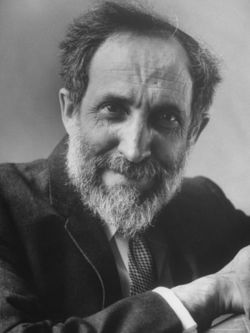Difference between revisions of "Louis Finkelstein (1895-1991), scholar"
| (8 intermediate revisions by the same user not shown) | |||
| Line 1: | Line 1: | ||
[[File:Louis Finkelstein.jpg|thumb|250px]] | |||
'''Louis Finkelstein''' (1895-1991) was a Jewish-American rabbi and scholar. Born June 14, 1895 in Cincinnati, Ohio. Earned doctorate from Columbia University (1918). Became a rabbi in 1919. Instructor of Talmud and later President (1940-1951) and Chancellor (1951-1972) of the Jewish Theological Seminary of America. A specialist in Jewish law and the history of Pharisaism. The most prominent voice of his era in the Conservative Jewish movement, under Finkelstein's leadership the Conservative Jewish movement emerged as the largest organized body of American Jews. Pioneer of interfaith dialogue. In 1938 established the Institute for Religious and Social Studies (from 1986 the Finkelstein Institute), which brought together Protestant, Catholic and Jewish scholars for theological discussions. | |||
American | |||
==Works | ==Works == | ||
====Books==== | ====Books==== | ||
*[[Akiba: Scholar, Saint and Martyr (1936 Finkelstein), book]] | |||
*[[The Pharisees: The Sociological Background of Their Faith (1938 Finkelstein), book]] | *[[The Pharisees: The Sociological Background of Their Faith (1938 Finkelstein), book]] | ||
*[[Pharisaism in the Making: Selected Essays (1972 Finkelstein), book]] | *[[Pharisaism in the Making: Selected Essays (1972 Finkelstein), book]] | ||
====Edited volumes==== | |||
*[[The Cambridge History of Judaism: 1. Introduction, the Persian Period (1984 Davies, Finkelstein), edited volume]] | |||
==External links== | ==External links== | ||
*[http://en.wikipedia.org/wiki/Louis_Finkelstein Wikipedia] | *[http://en.wikipedia.org/wiki/Louis_Finkelstein Wikipedia] | ||
[[Category:Scholars|Finkelstein]] | [[Category:Scholars|1895 Finkelstein]] | ||
[[Category:American|Finkelstein]] | |||
[[Category:American | [[Category:American|1895 Finkelstein]] | ||
[[Category:Jewish|Finkelstein]] | [[Category:American Scholars|1895 Finkelstein]] | ||
[[Category:Jewish | |||
[[Category:Born in the 1890s|Finkelstein]] | [[Category:Jewish-American|1895 Finkelstein]] | ||
[[Category:Died in the 1990s|Finkelstein]] | [[Category:Jewish-American Scholars|1895 Finkelstein]] | ||
[[Category:Jewish|1895 Finkelstein]] | |||
[[Category:Jewish Scholars|1895 Finkelstein]] | |||
[[Category:Born in the 1890s| 1895 Finkelstein]] | |||
[[Category:Died in the 1990s| 1991 Finkelstein]] | |||
[[Category:Second Temple Studies|~1895 Finkelstein]] | |||
Latest revision as of 02:48, 23 May 2016
Louis Finkelstein (1895-1991) was a Jewish-American rabbi and scholar. Born June 14, 1895 in Cincinnati, Ohio. Earned doctorate from Columbia University (1918). Became a rabbi in 1919. Instructor of Talmud and later President (1940-1951) and Chancellor (1951-1972) of the Jewish Theological Seminary of America. A specialist in Jewish law and the history of Pharisaism. The most prominent voice of his era in the Conservative Jewish movement, under Finkelstein's leadership the Conservative Jewish movement emerged as the largest organized body of American Jews. Pioneer of interfaith dialogue. In 1938 established the Institute for Religious and Social Studies (from 1986 the Finkelstein Institute), which brought together Protestant, Catholic and Jewish scholars for theological discussions.
